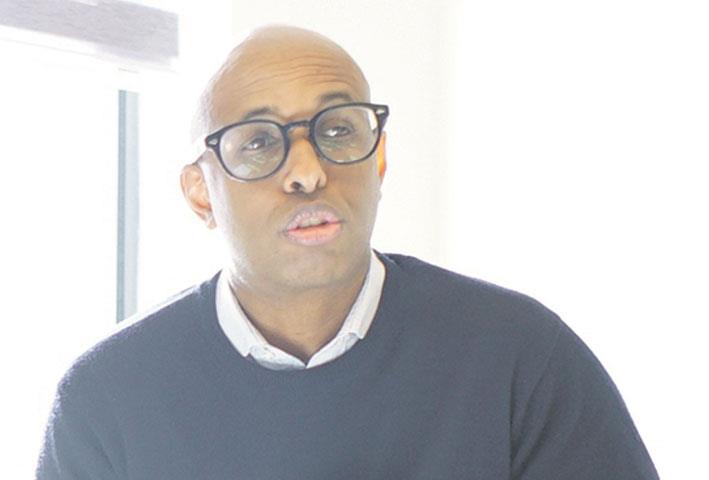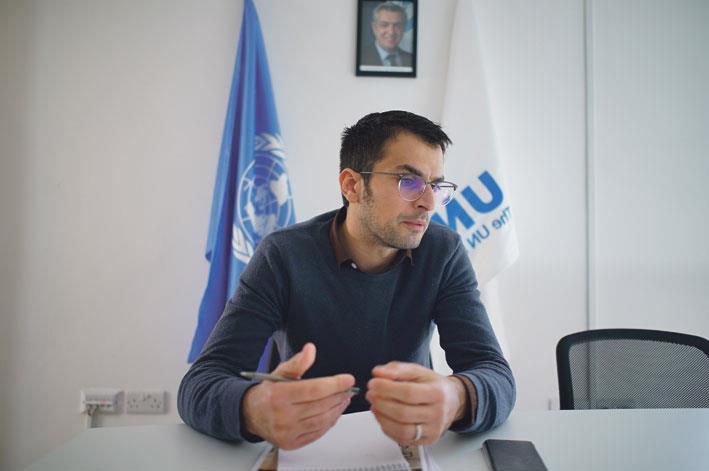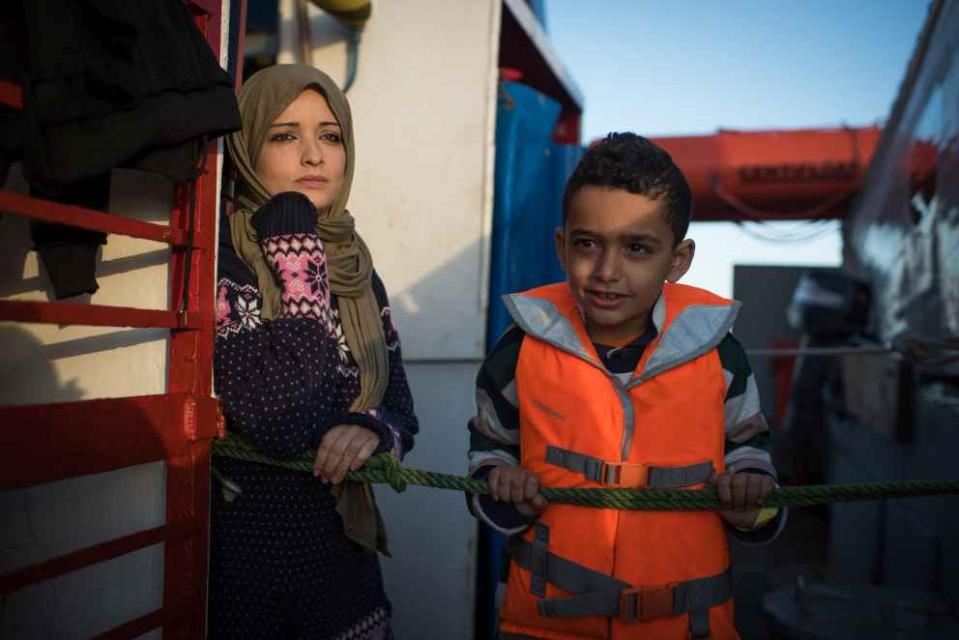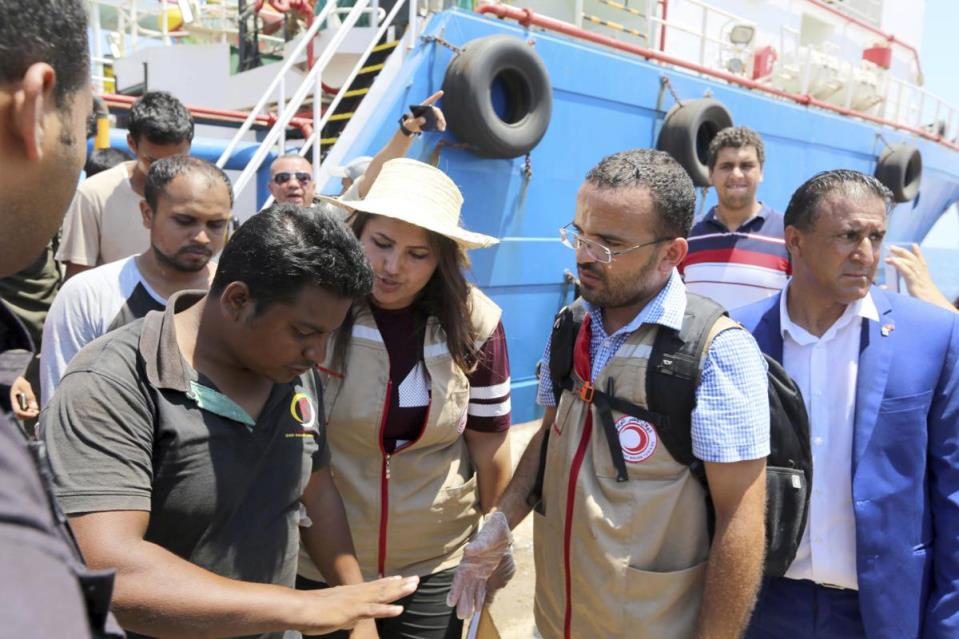One of the biggest changes in the migratory dynamic over the course of 2018 was an increase in the arrival of migrant boats to Malta, with these having stopped completely since 2015 and 2016, the representative in Malta for the United Nations Refugee Agency Kahin Ismail said in an interview with The Malta Independent.
Ismail said that this influx in boat arrivals is probably the biggest change seen this year, and noted the MV Lifeline case from last summer along with cases involving other NGO boats and recent rescues carried out by the Armed Forces of Malta as examples of this influx.
Over the holiday period the AFM rescued 249 migrants in distress, whilst a further 49 migrants remain, at the time of writing, stranded outside Maltese shores onboard two NGO vessels: the Sea-Watch 3 operated by Sea-Watch and the Professor Albrecht Penck operated by Sea-Eye.
Fabrizio Ellul, also from UNHCR, explains that this is in fact something of an abnormal influx of migrants considering the period of the year, but one has to consider things in a wider perspective before drawing conclusions over whether it could be indicative of an influx which could be reflected over the course of the upcoming year. However, Ellul said, one must always be prepared for any eventuality as while it’s difficult to predict increases or decreases, the likelihood is that such boat arrivals would continue.

Kahin Ismail
With regards to the situation that the Sea-Watch and Sea-Eye vessels, Ellul said that those onboard had already been through a lot even prior to their journey into the Mediterranean sea and that the more the current situation persists, the more suffering is being added.
In the interview, which was held last Friday, he said that the number of migrants stranded is not a big amount, which leads him to conclude that the matter is being fought more on the basis of principle than anything else. This assertion was confirmed on Sunday by the Prime Minister himself, when during his customary Sunday address he said that the NGO vessels had not been allowed in as it would set a precedent for future cases.
The 249 migrants rescued by the AFM was divided into three groups, and one group of 69 migrants reportedly contained migrants from Bangladesh – a country far beyond the reaches of the Mediterranean. Asked about the presence of people of this nationality in the Mediterranean, Ellul said that there has indeed been something of an influx in Bangladeshi migrants arriving by boat to Malta – some 178 such Bangladeshis have in fact arrived in 2018.
There has been a shift in the nationalities of migrants coming into Malta over the past years. Prior to 2015 and the collapse of the Gaddafi regime in Libya, Ellul explains, the main countries of origin of the arriving migrants were Somalia, Eritrea, Sudan and, to a lesser extent, Ethiopia.

Fabrizio Ellul
After the collapse of the Gaddafi regime and the parallel unrest in Syria however, Libyans and Syrians became the primary people applying for asylum. In fact, when the regime collapsed, boat arrivals almost stopped but at the same time, asylum applications increased.
Another source of migrants coming to Malta was actually those arriving through Italy. Ellul explained that a number of Somalis and other African nationals had arrived through Italy and, having been granted asylum, would travel to Malta by plane or ferry. The shifts in nationality noted here are, Ellul explained, most likely down to the situation in the country of origin – this year in fact in the midst of a re-flaring up of tensions in Sudan, there has been another influx of Sudanese migrants making the trip across the Mediterranean.
This being said however, things have to be taken into perspective, both Ellul and Ismail explained. Ellul noted that the primary entry point for migrants travelling to Europe has been through Spain. Statistics issued by the UNHCR in fact note that out of the 123,109 arrivals in 2018, 65,383 of those arrived in Spain. A further 32,497 arrived in Greece whilst 23,371 arrived in Italy. Malta has taken in 1,445 arrivals. These same statistics also indicate that the total number of sea arrivals for 2018 is at its lowest when compared to recent years.
Ismail in fact noted that 86% of migrants go to developing countries, and he said that he had recently seen statistics which showed that Yemen - a country currently in the throes of its own deadly conflict – had actually received more migrants by sea than Europe did as a whole last year. “We hear this narrative that Europe is being invaded by migrants and refugees, but the statistics show that this is not the case”, Ismail said.

The UNHCR estimates that over the course of 2018 there were 2,262 people either dead or missing as a result of the sea crossings that they had attempted in the Mediterranean.
Ismail explains and indeed urges that a predictable mechanism for the rescue and disembarkation of sea arrivals needs to be created so that countries can come together and agree on a way to share responsibility and show solidarity. At the moment, Ismail said, there is no such agreement. Malta and Italy are at the frontline of this situation, but such an agreement cannot involve just them – it has to involve all countries in the EU, and even in North Africa.
Asked about the argument that such migrants should be sent either back to Libya or other North African countries such as Tunisia, Ismail noted firstly that Libya is most certainly not safe for people to be sent back to – in fact, he said, UNHCR has re-issued a position paper that it had initially published in 2015 so as to reiterate that, due to the situation in terms of security, law enforcement, human conditions and the sheer vacuum of power that is present in the country, Libya is definitely not a safe port for anyone to be returned to.
Turning to Tunisia however, Ismail said that the aforementioned mechanism must involve North African countries such as Tunisia, so that these countries become part of the solution and so that they take responsibility of rescues in their own waters as well.

Ismail said that the current situation was leaving those most vulnerable – refugees – stranded, and he said that UNHCR had also received reports of merchant ships going against the age-old custom of helping those in distress on the high seas because they know that if they had to carry out a rescue they would be faced with uncertainty in terms of disembarkation. Ismail added once again that there has to be a measure of solidarity on this matter, and said that he hoped that such an agreement on a system like this would come into being in 2019.
A notable measure that the UNHCR has worked on in the past two years was a Global Compact on Refugees, the key objectives of which are to strengthen the international response to large movements of refugees and protracted refugee situations.
Its four prime objectives are namely to ease the pressures on host countries, enhance refugee self-reliance, expand access to third-country solutions, and to support conditions in countries of origin for return in safety and dignity.
Ismail explained that the compact was ideal to assist countries who have to support refugees, but also assist refugees in their country of origin so that they do not partake on dangerous journeys such as those across the Mediterranean.
This compact was adopted last December with 181 votes, including Malta, in favour. The governments of Libya, Eritrea and Liberia abstained on it, whilst Hungary and the United States of America voted against it. This compact, Ismail said, also runs in parallel with another Global Compact relating to safe migration which was also approved last December by 164 governments, again including Malta’s, in Marrakech last month.

Moving back to the situation in the Mediterranean and asked whether the problems that NGOs faced throughout the summer had affected the migratory dynamic, Ellul said that it was difficult to quantify whether there had been any direct impact, but he said that people organising the smuggling would have had to adapt to the situation.
He explained that in such a situation, the smugglers would have likely provided the migrants with sturdier boats, more fuel and maybe even a satellite phone so that they could actually reach Malta or Italy. However, he said, the danger will always be there irrespective of this as the boats will always be overcrowded and food and water will eventually run out anyway.
In an interview carried out last July, members of the NGO Sea-Watch told The Malta Independent that the UNHCR had limited access to Libyan detention centres.
Asked about the level of this access and whether this had changed in recent months, Ismail said that out of the 30 or so official detention centres, UNHCR only had access to around 15 of them; access which depended heavily on the security situation in the country. Lately for instance, Ismail explains, due to major incidents within Libya, access to and movement within the country has been very limited.
He added that there are certainly a number of other unofficial detention centres, some of which the organisation may not even know about, operated by different armed groups, militias or even the smugglers themselves, so it is certain that the UNHCR does not have access to every centre.
Ismail made reference to a report published by the United Nation’s Mission in Libya on the detention centre published in 2018, with the report laying bare the appalling conditions that the detained face on a daily basis. One facility believed to be the largest of its kind in western Libya, the report notes, houses 2,600 people who face torture, unlawful killing, denial of adequate medical treatment and poor detention conditions. The report’s findings are based on first-hand accounts and other information gathered from sources inside Libya.

Asked whether the presence of state naval assets had increased or decreased over the past year, Ismail noted that Operation Sophia had been extended by the EU for a further three months. Operation Sophia, which was formally known as the European Union Naval Force Mediterranean, is a military operation of the European Union that was established as a consequence of the April 2015 Libya migrant shipwrecks with the aim of neutralising established refugee smuggling routes in the Mediterranean.
Ismail also said that there were discussions going on at an EU level about Frontex as well, but noted that there has been a decline as of late in terms of the capacity of rescue because of the restrictions imposed on many NGOs engaged in this line of work.
The Sea-Watch’s vessel for instance had been impounded in Malta for a number of months, the MV Aquarius faced problems with its registration after Gibraltar threatened to rescind its registration, whilst the MV Lifeline is still docked in Malta pending a court case on its registration.
Whilst compared with 2016 for instance, the number of migrants coming into the central Mediterranean had been drastically reduced, the death rate in the Mediterranean still remains high because people are not being rescued at sea.
Asked about the political situation especially in terms of the dynamic between Malta and Italy on migration, Ismail said that whilst he would not comment on the political aspect of the situation, from a humanitarian point of view there was no framework or mechanism for the coordination of dealing with such arrivals. This lack of coordination was leading to a precarious and uncertain situation which is resulting in humanitarian consequences that only those trying to flee from war and persecution will suffer from.
This is why, Ismail concluded, the UNHCR is advocating and urging the drawing up of a comprehensive mechanism between countries in the EU and in North Africa to specifically deal with these types of arrivals.
In light of the fact that the situation surrounding the stranded Sea-Watch and Sea-Eye vessels is still ongoing at the time of print and due to the fact that certain comments within this article relate to that case; it should be noted that this interview was carried out on Friday 4 January.